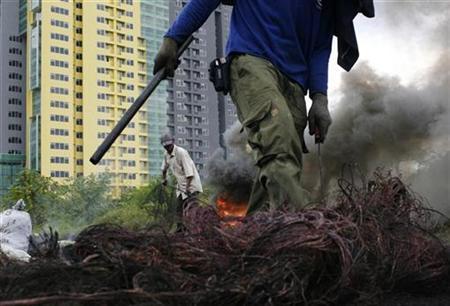Date: 03-Mar-09
Country: BELGIUM
Author: Pete Harrison

EU
Inches Towards Climate Funding For Poor Nations Photo: Beawiharta
Workers burn coils of power cable to extract copper for resale in Jakarta's
business district March 2, 2009.
Photo: Beawiharta
BRUSSELS - European environment ministers inched towards agreeing how to
raise billions of dollars to help poor countries prepare for global warming
and to coax them into a global deal to tackle the problem.
But cracks started to emerge on Monday among the European Union's 27 nations
on how to split the burden of finance, and whether it would be wise to name
a figure early in the game.
Success at global talks in December in Copenhagen to find a successor to the
Kyoto protocol will largely hinge on whether developing nations can be
persuaded to try to curb emissions of greenhouse gases to alleviate a
problem they say has been caused by industrialised nations.
Europe and the United States are seen as the main donors.
"It makes no sense to say now how much the EU is willing to transfer,"
Germany's Sigmar Gabriel told reporters. "We will negotiate that in
Copenhagen. We are creeping towards a number."
Global investment to fight climate change will need to rise to around 175
billion euros ($220 billion) per year by 2020, with over 90 billion of that
spent in developing countries, says an EU report.
Campaign group Greenpeace says Europe's nineteenth century industrial
revolution was a major contributor to global warming and has called on the
EU to contribute around 35 billion euros a year by 2020.
Some EU countries, including Italy, are pushing to have the numbers dropped
from the EU's negotiating position, documents show. Others, including
Germany, feel they are necessary to win the backing of poor nations.
Greenpeace campaigner Joris den Blanken warned: "This could again paralyse
UN climate negotiations. Last year, it became clear negotiations didn't move
forward because the EU hadn't done its homework on financial support."
Two funding routes were considered on Monday: money raised through the
auction of pollution permits in carbon markets around the world, or a
mechanism whereby funds are levied according to a country's economic
strength, population growth and emissions.
Countries that rely on highly-polluting coal, like Poland, will reject any
attempt to link contributions to the level of emissions, a Polish diplomat
said.
Martin Bursik, environment minister for the EU's Czech presidency, said
nothing could be certain without knowing the position of the United States.
"We are still waiting on the United States, that they provide us the
mid-term targets and that they will adopt the cap-and-trade system and talk
about their money," he said.
(Additional reporting by Ilona Wissenbach; editing by Andrew Roche)
© Thomson Reuters 2009 All rights reserved
